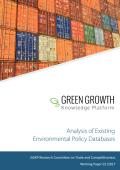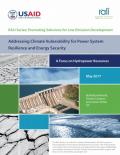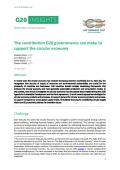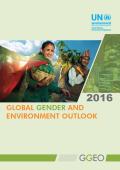
An enduring concern for developed and developing countries alike is to strike the right balance between ambitious environmental policies and the international competitiveness of both nations and individual firms. Significant advances have been made in measuring the stringency of environmental policies and understanding the relationship between environmental action and economic dynamics. However, the literature evaluating these issues in the context of developing countries remains sparse, mainly due to a lack of data.

This paper aims to inform energy planners and investors about i) how climate change can affect power generation resources, particularly hydropower resources; and ii) an approach that can be taken to address climate change risks, both at the project and sector level, to improve power system resilience and enhance energy security.

In recent years the circular economy has received increasing attention worldwide due to, inter alia, the recognition that security of supply of resources and environmental sustainability are crucial for the prosperity of countries and businesses. G20 countries should consider developing frameworks that enhance the circular economy and more generally sustainable production and consumption modes. In this context, they should 1) integrate the circular economy into discussions about implementing the 2030 Agenda for Sustainable Development and the Paris Agreement, 2) work towards agreed terminologies for circular economy products and processes, 3) support demand for circular economy products and services, 4) support transparency across global supply chains, 5) facilitate financing for establishing circular supply chains and 6) proactively address the transition issues.

This report, the first international assessment of this type, investigates the life-cycle environmental and natural resource implications of large-scale deployment of energy efficiency technologies. The report examines more than 30 demand-side energy efficiency technologies across different technological clusters, including lighting, buildings, information and communication technology, efficient metals processing, high-efficiency cogeneration, and transportation. In addition, the combined effects of low-carbon energy supply and deployment of efficient demand-side technologies under the 2 degree and 6 degree Celsius scenarios are assessed. Research confirms that demand-side technologies reduce greenhouse gas emissions as well as many other environmental impacts. However, the magnitude of those improvements varies widely among technologies and regions. In some cases, demand-side technologies may increase resource consumption and even greenhouse gas emissions. Therefore, it is crucial to understand where, when, and with which technology investment should be placed to maximise benefits.

